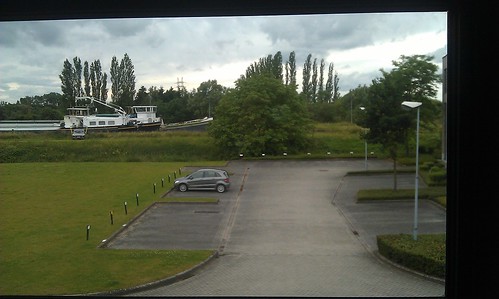Life: general update
In case you were wondering what had happened to my blog over the past few weeks: the server on which it runs, samba.nixsys.be, has been down for that time, since we've just moved office.
There's a story behind it, with which I won't bore you; suffice to say that we had to move out because of circumstances beyond our control. If you really do care, ask me over a beer or something (at debconf would be a good opportunity). I'll happily tell you the story.
Meanwhile, the server on which this blog runs and which was located in a separate room at our office was now no longer available. But that's now over, albeit that it's behind a different IP address, and ignoring the fact that I still have some minor things to finish after the move.
During this move, I found that we'd accumulated quite an amount of old unused hardware. While I've retained some of it (mostly my m68k machines, and some other machines that were given to me in order to add or improve Debian support for them), most of it has been given or thrown away. And that's even ignoring the other crap that had been in the cellar or the server/storage room. Oh my.
I had severely underestimated the amount of work that would be required to clean out the office, which unfortunately also meant that I overshot the official date on which I were to leave the office by about two weeks. Luckily the landlord wasn't in a hurry or something, so no harm done.
But I'll say this: if I ever say "yes" to anyone offering me some old decrepit hardware again for which I have no immediate purpose, may I be struck by lightning where I stand.
Anyway.
There's one significant advantage from this particular move: the view. I've gone from a dead wall to this:
Which is clearly an improvement...
Additionally, now just over a month ago, my bother's fiancée gave birth to a boy, which makes me an uncle for the first time ever. Scary.
E-voting in Belgium
A post by Gunnar reminded me that I wanted to blog about this: e-voting in Belgium is going to change slightly.
Previously, e-voting worked with a computer with a lightpen on which you would enter your vote, a magnetic card that would contain your vote in encoded form, and a magnetic card reader that would count the votes. After more than a decade—when I was first eligible to vote back in 1996, it had already been implemented in the city of Antwerp, where my vote would be cast, so I've never voted on paper—it had still not been rolled out everywhere, and some of the computers used for the voting were now starting to show their age.
A few days ago on the news, they reported that the e-voting system was to change so that rather than magnetic cards, it would use pieces of paper. This way, voters would be able to check that the information on the piece of paper conforms with their vote.
Investigating what this means, I found this website by the federal government, where they have some pictures of a test run of the new system which they ran in October last year. Rather than using magnetic cards, the new system uses paper slips with the voted information in two forms: once as a (huge) QR code, and once as a human-readable text.
In theory, this is a more transparent system than using a magnetic card, and that's a good thing; additionally, it allows for a traditional recount (by people, not computers) should the need ever arise. However, I do still see some problems:
- The website says you need to first fold the slip, and then unfold it when you get at the scanner so you can scan your barcode. This risks violating the secrecy of the vote, as people will be able to glance what other people have voted as they unfold the slip. I'm not sure how this can be fixed.
- If the vote is printed on the paper slip in two forms, you need to be able to guarantee in some way that the two forms are the exact same information. People with smartphones can scan the QR code and compare it to the human-readable code, but not everyone has one of those.
Having said that, I do think the new system is an improvement over the old (in fact, it's exactly the kind of system I had thought about myself earlier when thinking about ways to improve e-voting); and if the two problems are solved in some way (it's not impossible to do that, just requires some clever thinking), I believe it has potential as a way to implement electronic voting in a good way.
On my way to dc12
I'm writing this from a hotel room near Heathrow airport, where I'll spend the night—I don't like having to get up at early-o-clock in order to get to the airport, so I took a flight on the 30th in the comfortable afternoon, rather than one on the 1st in the uncomfortable morning.
Of course that means I get to spend the night in London tonight. As it happens, it'll be my first time that I'll do that; I've been in London before, but it's always been when I was in transit—changing planes or trains in Heathrow, or when I was on my way (by car) to Steve's last summer. But I've never been to London for London.
Tonight, that isn't the case either, but at least this time I'll get to see more of this city than the airport, King's Cross and Waterloo station, the underground, and the highway network.
And then tomorrow, again in the comfortable afternoon, I'll be on my way to Managua. I can hardly wait.
